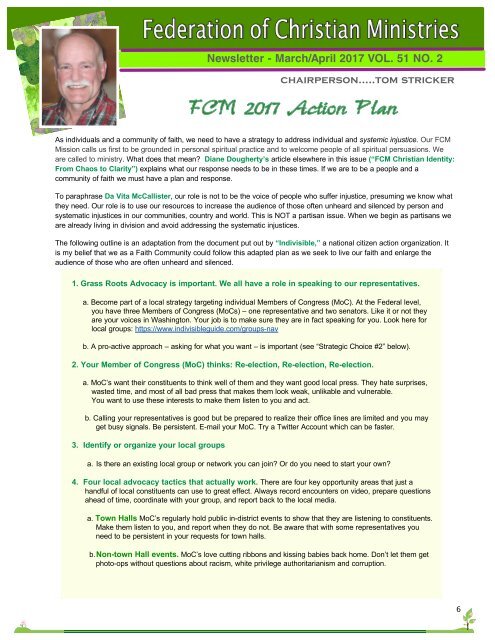March:April 2017 FCM Newsletter 2
You also want an ePaper? Increase the reach of your titles
YUMPU automatically turns print PDFs into web optimized ePapers that Google loves.
<strong>Newsletter</strong> - <strong>March</strong>/<strong>April</strong> <strong>2017</strong> VOL. 51 NO. 2<br />
chairperson.....tom stricker<br />
As individuals and a community of faith, we need to have a strategy to address individual and systemic injustice. Our <strong>FCM</strong><br />
Mission calls us first to be grounded in personal spiritual practice and to welcome people of all spiritual persuasions. We<br />
are called to ministry. What does that mean? Diane Dougherty’s article elsewhere in this issue (“<strong>FCM</strong> Christian Identity:<br />
From Chaos to Clarity”) explains what our response needs to be in these times. If we are to be a people and a<br />
community of faith we must have a plan and response.<br />
To paraphrase Da Vita McCallister, our role is not to be the voice of people who suffer injustice, presuming we know what<br />
they need. Our role is to use our resources to increase the audience of those often unheard and silenced by person and<br />
systematic injustices in our communities, country and world. This is NOT a partisan issue. When we begin as partisans we<br />
are already living in division and avoid addressing the systematic injustices.<br />
The following outline is an adaptation from the document put out by “Indivisible,” a national citizen action organization. It<br />
is my belief that we as a Faith Community could follow this adapted plan as we seek to live our faith and enlarge the<br />
audience of those who are often unheard and silenced.<br />
1. Grass Roots Advocacy is important. We all have a role in speaking to our representatives.<br />
a. Become part of a local strategy targeting individual Members of Congress (MoC). At the Federal level,<br />
you have three Members of Congress (MoCs) – one representative and two senators. Like it or not they<br />
are your voices in Washington. Your job is to make sure they are in fact speaking for you. Look here for<br />
local groups: https://www.indivisibleguide.com/groups-nav<br />
b. A pro-active approach – asking for what you want – is important (see “Strategic Choice #2” below).<br />
2. Your Member of Congress (MoC) thinks: Re-election, Re-election, Re-election.<br />
a. MoC’s want their constituents to think well of them and they want good local press. They hate surprises,<br />
wasted time, and most of all bad press that makes them look weak, unlikable and vulnerable.<br />
You want to use these interests to make them listen to you and act.<br />
b. Calling your representatives is good but be prepared to realize their office lines are limited and you may<br />
get busy signals. Be persistent. E-mail your MoC. Try a Twitter Account which can be faster.<br />
3. Identify or organize your local groups<br />
a. Is there an existing local group or network you can join? Or do you need to start your own?<br />
4. Four local advocacy tactics that actually work. There are four key opportunity areas that just a<br />
handful of local constituents can use to great effect. Always record encounters on video, prepare questions<br />
ahead of time, coordinate with your group, and report back to the local media.<br />
a. Town Halls MoC’s regularly hold public in-district events to show that they are listening to constituents.<br />
Make them listen to you, and report when they do not. Be aware that with some representatives you<br />
need to be persistent in your requests for town halls.<br />
b. Non-town Hall events. MoC’s love cutting ribbons and kissing babies back home. Don’t let them get<br />
photo-ops without questions about racism, white privilege authoritarianism and corruption.<br />
6





